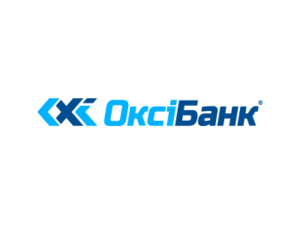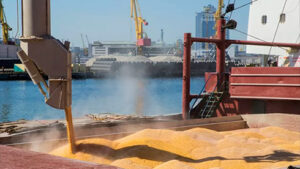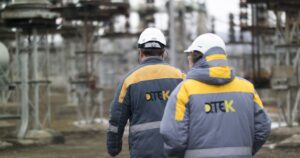
The European Bank for Reconstruction and Development (EBRD) is lending EUR10.6 million to the municipal enterprise (CE) Electrotrans (Khmelnitsky) to finance the purchase of new trolleybuses, as well as equipment for maintenance and diagnostics, according to a press release from the bank.
The EBRD loan is part of a financing package that also includes investment grants from the EU Neighbourhood Investment Platform of up to EUR2.75 million and up to EUR1.7 million from the EBRD’s Special Crisis Response Fund, which receives a contribution from the U.S. government, according to the statement Friday.
The loan and grants will be used to purchase new trolleybuses with remote monitoring systems, spare parts and service equipment.
In turn, the city will cover the cost of installing surveillance cameras inside the trolleybuses and upgrading the trolleybus stops, traction substations and trolleybus depot in the amount of EUR1.5 million.
The press release reminds us that the project is part of the EBRD’s Green Cities program, which Khmelnitsky joined in 2019. The first project, signed in October 2020, concerned improving solid waste management.
“Both projects are extremely important to the residents of Khmelnitsky: the ongoing project – to improve solid waste management – and the project to purchase new trolleybuses. We are glad that we can implement them exactly with the EBRD, our long-term partner, despite the war caused by Russian aggression,” the press service quotes Khmelnitsky Mayor Alexander Simchyshyn, who represented the city in Warsaw at the signing of the agreement with EBRD Managing Director for Sustainable Infrastructure Development Nandita Parshad.
As reported, earlier Simchyshyn noted that up to 45 low-floor trolleybuses are planned to buy with EBRD funds and grants, but at the same time, their number will depend on the cost of trolleybuses, which has increased.
The EBRD press service states that after the full-scale invasion of Ukraine by Russia, Khmelnytskyi faced a large flow of internally displaced persons (IDPs), which put a strain on city services.
The EBRD resumed work with Khmelnitsky in June, adding an IDP needs assessment to the Green City Action Plan, with funding provided by the Swedish government.
The EBRD’s Green Cities program was founded in 2016. Since then, it has helped more than 50 cities on three continents, with more than EUR5 billion spent on its support.
In Ukraine, Lviv, Kiev, Kryvyi Rig, Dnipro, Khmelnitsky joined it, among others.
As it was reported, the EBRD together with donors undertook to provide financing in the amount of EUR3 billion for support of functioning of business and economy in Ukraine in 2022-2023. In 2022, the bank allocated EUR1.7bn to support Ukraine and attracted EUR200m from partner financial institutions.

On April 24, Oksiy Stolyarov, the head of the board of Oksiy Bank (Lviv), will resign at his own request. Alexander Skvortsov, the deputy head of the board, was appointed Acting CEO on April 25.
According to the bank’s message in the NCCFM disclosure system, the decision was made by the bank’s Supervisory Board on April 19.
Skvortsov appointed as acting chief executive officer until the date of assumption of office by the head of the board agreed by the National Bank, is indicated in the information.
It is specified that Skvortsov till November, 2021 was at first the deputy and then the head of department of information security of bank. Before that, he was manager of information security of LLC “Consumer Center”, director of the department of information security of LLC “NovaPay”, head of the information security service of the bank “Avangard”.
Stolyarov has chaired the board since April 25, 2022.
Oxy Bank (formerly Gals Bank) was registered in 1991. According to the NBU, its largest shareholders are Oleg Balyash (50.4467%) and his wife Oksana Balyash (25%), as well as Igor Fisun (9.95%).
According to the National Bank of Ukraine, as of March 1, 2023, Oksi Bank ranked 59th by total assets (UAH 740.5 million) among 65 operating banks in the country.

Ukrainian President Volodymyr Zelenskyy has signed a law providing for exams in the basics of the Constitution, history of Ukraine and the level of proficiency in the state language as a condition for obtaining Ukrainian citizenship.
As noted in the card of the corresponding bill No. 7606, posted on the website of the Verkhovna Rada, the document was returned to the parliament with the signature of the head of state on 21 April.
Most of the provisions of the law come into force six months after the date of its publication in the parliamentary newspaper “Holos Ukrainy”.
The document stipulates that the conditions for admission of foreigners/citizens without citizenship to Ukrainian citizenship include knowledge of the basics of the Constitution and history of Ukraine, as well as knowledge of the state language and compulsory exams in these subjects.
According to the proposed amendment to the law, a foreigner/citizen without citizenship who wishes to acquire Ukrainian citizenship shall submit in writing a statement to the effect that in the event of acquiring Ukrainian citizenship, he/she will be obliged to pass examinations in the basics of the Constitution of Ukraine, the history of the country, the level of command of the state language and, within two years, present documents on passing such examinations.
At the same time, the law proposes to introduce special conditions for acquiring citizenship for persons who have rendered outstanding service to Ukraine, who are of state interest to Ukraine, who serve under contract in the Armed Forces of Ukraine, including those awarded with state awards, or who have received a temporary residence permit. Such persons will be obliged within two years from the moment of acceptance of Ukrainian citizenship to pass exams on the basics of the Constitution and history of Ukraine and on the level of state language proficiency.
The document provides that the failure to pass the exams is the basis for the loss of citizenship.
As reported, the bill was initiated by the Prime Minister of Ukraine Denis Shmygal. The document was registered in the Verkhovna Rada on July 28, 2022. The Rada passed the bill in the first reading on October 18, and as a whole on March 21.

Ukraine exported through seaports of Odessa region by 7% more agricultural products than a week earlier, its volume was 702.3 thousand tons. The increase in shipments was achieved due to the tonnage of ships, said the Ukrainian Agrarian Confederation of Business (UCAB).
“The number of ships loaded this week was only 14 units, which is two vessels less than the previous week. In fact, increase of shipments was achieved due to increase of tonnage of ships,” – analysts noted.
According to their information, corn (56%), wheat (18%) and sunflower oil cake (14%) took the major part in the export structure of Ukrainian agricultural products through this channel.
Ukrainian products went to Asian countries (China, Bangladesh, India and others), Europe (Spain, Portugal and Italy) and Africa (Egypt).
At the same time, the overall situation with the operation of the “grain corridor” continues to deteriorate. The Russian side suspended the inspection of ships on Tuesday, April 11 and Monday, April 17, 2023.
In the next three days, inspections of ships in the “grain corridor” will resume in accordance with a 50:50 temporary scheme, according to which 50% of inspections will be carried out by ships of the formed line, another 50% – by humanitarian cargoes.
In total, since the beginning of the “grain corridor” from August 1, 2022 to April 16, 2023, Ukraine has exported 28.1 million tons of agricultural products.

Since the beginning of Russia’s full-scale invasion of Ukraine, DTEK Energy’s coal mining, power and machine-building companies have hired over 6.8 thousand new employees, more than 2.6 thousand of whom are IDPs, the energy holding said in a press release on Wednesday.
“The lion’s share (of the total number of employees – IF-U), which is more than 2.6 thousand people, are Ukrainians who were forced to leave their homes due to the occupation or the proximity of hostilities,” the document says.
According to the company, the vast majority of IDPs, which is about 95%, were employed at DTEK Energy’s coal mining enterprises. Most of them did not have a mining specialty and were retrained directly at the workplace.
“Another 850 new employees are young people who have just graduated from educational institutions and found their first jobs at mines,” the energy holding said.
According to DTEK Energy CEO Ildar Saleev, during the war it is extremely important that each company not only works to the maximum but also remains a responsible employer and a reliable partner for communities.
“In the history of DTEK Energy, we have experienced numerous relocations of employees from dangerous places and relocations of our enterprises. That is why we understand and always try to support people forced to leave their homes because of the hostilities,” said Saleyev in a press release.
“DTEK Energy provides a closed cycle of electricity generation from coal. The installed capacity of thermal generation as of January 2022 is 13.3 GW. A full production cycle has been created in coal mining: coal mining and enrichment, machine building and maintenance of mine equipment.
DTEK Group is the largest private investor in the energy sector of Ukraine.
DTEK Group companies are engaged in coal and natural gas production, electricity generation at wind, solar and thermal power plants, energy trading on local and international markets, distribution and supply of electricity to consumers, and energy efficiency services to customers.
The group employs about 60 thousand people.
100% of DTEK Group is owned by SCM Limited, with Rinat Akhmetov as the ultimate beneficiary.
The saturated market of Ukraine and its geographical location make our country an attractive market for foreign goods. However, importing goods to Ukraine is a complex process that requires knowledge of legislation, international relations, and customs clearance procedures. These and other issues were discussed by the founder of the Club of Experts Maxim Urakin and the President of the Ukrainian Exporters Club Yevheniia Lytvynova in a new video on the YouTube channel “Club of Experts”.
According to Maksym Urakin, before starting to import goods, it is necessary to conduct a detailed analysis of the market and legislation of Ukraine and the exporting country, as well as calculate all costs associated with delivery, customs clearance and taxes.
“This will help you draw up a clear action plan and avoid unpleasant situations during the import process,” the expert emphasized.
Yevheniia Lytvynova, President of the Ukrainian Exporters Club, also emphasizes the need to research the market and check the reputation of potential suppliers.
“Market research and checking the reputation of potential partners can help you find a reliable supplier,” she said.
According to Yevheniia Lytvynova, successful import of goods requires a thorough analysis of all aspects of the importer’s future business strategy.
“Before you start importing goods, you need to conduct a detailed analysis of the market, legal requirements and your capabilities, as well as calculate all the costs associated with delivery, customs clearance and taxes. This will help you draw up a clear plan of action and avoid unpleasant situations during the import process,” emphasized Lytvynova.
Regarding the documents to be prepared for importing goods, Lytvynova noted that the contract between the importer and exporter, invoice, transportation document (e.g., waybill or bill of lading), quality certificate and certificate of origin should be put in the forefront.
“In addition to these basic documents, additional documents may be required depending on the characteristics of the goods and the requirements of Ukrainian legislation. In particular, licenses, certificates of conformity, permits and other documents confirming compliance with safety, hygiene, environmental requirements, etc. may be required,” she explained.
Maksym Urakin also emphasized that studying local legislation and choosing a reliable supplier are also very important steps in the import process. According to the experts, in order to successfully sell goods in Ukraine, it is also necessary to take into account the difficulties that may arise after their delivery.
“Even if the goods are of high quality and interesting, they still need to be sold. But here in Ukraine, even after obtaining certificates and relevant permits, sales can be restricted due to various customs barriers, which leads to breach of contract. Therefore, we advise our companies to conduct a detailed analysis of the market and legal requirements. This will allow them to prepare the right documentation and comply with all requirements,” said Yevgeniya Lytvynova.
To increase export sales, experts recommend improving product quality and providing buyers with more information about their goods.
“Nowadays, many buyers check the quality of goods and their compliance with standards. If your products don’t meet the requirements, they simply won’t buy them,” emphasized Maksym Urakin.
In this regard, experts advise to focus on developing the quality of goods and their competitiveness. In addition, according to Maxim Urakin, it is important to participate in international exhibitions and forums where you can find new partners and establish contacts with potential suppliers.
Thus, according to the experts, it is very important to comply with all the requirements and norms set by law when importing goods, conduct a detailed market analysis and check the reputation of suppliers. It is also important to ensure the quality of goods and timely delivery, while considering all possible risks and costs. Importing goods can be a very profitable business if you organize it properly. Experienced experts advise to study the market and determine your capabilities to avoid unpleasant situations and ensure successful business development.
Watch the full video here:
Subscribe to the Experts Club channel here:
EXPERTS, EXPERTS CLUB, EXPORT, EXPORTERS CLUB, IMPORT, IMPORT_PRODUCTS, LITVINOVA, URAKIN